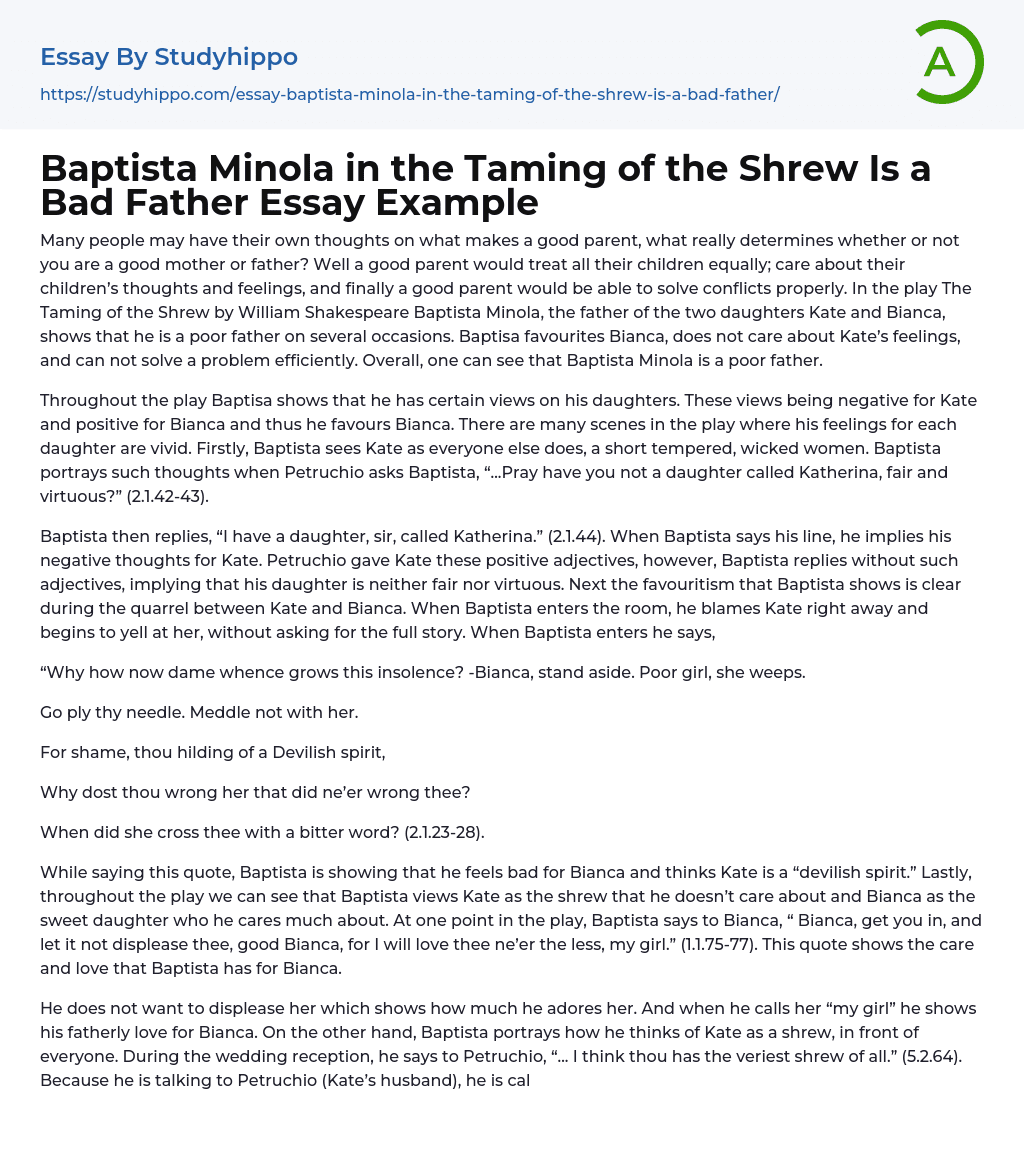

Baptista Minola in the Taming of the Shrew Is a Bad Father Essay Example
Many people may have their own thoughts on what makes a good parent, what really determines whether or not you are a good mother or father? Well a good parent would treat all their children equally; care about their children’s thoughts and feelings, and finally a good parent would be able to solve conflicts properly. In the play The Taming of the Shrew by William Shakespeare Baptista Minola, the father of the two daughters Kate and Bianca, shows that he is a poor father on several occasions. Baptisa favourites Bianca, does not care about Kate’s feelings, and can not solve a problem efficiently. Overall, one can see that Baptista Minola is a poor father.
Throughout the play Baptisa shows that he has certain views on his daughters. These views being negative for Kate and positive for Bianca and thus he favours Bianca. There are many scenes in
...the play where his feelings for each daughter are vivid. Firstly, Baptista sees Kate as everyone else does, a short tempered, wicked women. Baptista portrays such thoughts when Petruchio asks Baptista, “...Pray have you not a daughter called Katherina, fair and virtuous?” (2.1.42-43).
Baptista then replies, “I have a daughter, sir, called Katherina.” (2.1.44). When Baptista says his line, he implies his negative thoughts for Kate. Petruchio gave Kate these positive adjectives, however, Baptista replies without such adjectives, implying that his daughter is neither fair nor virtuous. Next the favouritism that Baptista shows is clear during the quarrel between Kate and Bianca. When Baptista enters the room, he blames Kate right away and begins to yell at her, without asking for the full story. When Baptista enters he says,
“Why how
now dame whence grows this insolence? -Bianca, stand aside. Poor girl, she weeps.
Go ply thy needle. Meddle not with her.
For shame, thou hilding of a Devilish spirit,
Why dost thou wrong her that did ne’er wrong thee?
When did she cross thee with a bitter word? (2.1.23-28).
While saying this quote, Baptista is showing that he feels bad for Bianca and thinks Kate is a “devilish spirit.” Lastly, throughout the play we can see that Baptista views Kate as the shrew that he doesn’t care about and Bianca as the sweet daughter who he cares much about. At one point in the play, Baptista says to Bianca, “ Bianca, get you in, and let it not displease thee, good Bianca, for I will love thee ne’er the less, my girl.” (1.1.75-77). This quote shows the care and love that Baptista has for Bianca.
He does not want to displease her which shows how much he adores her. And when he calls her “my girl” he shows his fatherly love for Bianca. On the other hand, Baptista portrays how he thinks of Kate as a shrew, in front of everyone. During the wedding reception, he says to Petruchio, “... I think thou has the veriest shrew of all.” (5.2.64). Because he is talking to Petruchio (Kate’s husband), he is calling Kate a shrew. Calling your daughter a shrew does not show very fatherly attributes but shows, once again, how he thinks of Kate negatively. From what Baptista has said throughout the play, one can see that he definitely struggles with keeping a fair relationship between his daughters. He favourites Bianca which makes him a bad father.
- Adoption essays
- Aunt essays
- Babies essays
- Bedroom essays
- Caring essays
- Children essays
- Daughter essays
- Divorce essays
- Dog essays
- Dysfunctional Family essays
- Family Tradition essays
- Family Values essays
- Father essays
- Foster Care essays
- Friends essays
- Grandparent essays
- Home essays
- Hometown essays
- Husband essays
- Jealousy essays
- Love essays
- Marriage essays
- Mother essays
- Online Dating essays
- Parenting essays
- Parenting Teens essays
- Parents essays
- Relationship essays
- Room essays
- Sibling essays
- Sister essays
- Wedding essays
- Wife essays
- A Doll's House essays
- A Midsummer Night's Dream essays
- A raisin in the sun essays
- A Streetcar Named Desire essays
- An Inspector Calls essays
- Death of a salesman essays
- Everyman essays
- Fences essays
- Hamlet essays
- Hedda Gabler essays
- Iago essays
- King Lear essays
- Macbeth essays
- Much ado about nothing essays
- Oedipus Rex essays
- Oedipus The King essays
- Othello essays



